
Don’t get left behind: developing skills for a digital future in Azerbaijan
“People say that women are less successful in ICT than men, but I disagree!” Gunel Ismaylova works as a digital specialist at the very place where she learned her skills, the ICT Applying and Training Centre (ICT LAB) of the Ministry of Transport, Communications and High Technologies.
“It would be fantastic if more projects focused on women,” says Gunel. “There are many women who are interested in ICT. It would be great if they could attain comprehensive and technical knowledge beyond the basic skills.”
But it’s not just women, and it’s not just in Azerbaijan. All over the world, people need to prepare for the demands of the new digital era, as digitalisation enters every sphere of activity. Technical, legal and organisational frameworks are needed to support the expansion of these technologies, and to ensure that people have the digital skills to meet the market demand.
The European Union supports the implementation of digital skills strategies in the Eastern Partnership countries, including Azerbaijan. Through the EU4Digital initiative, it aims to extend the benefits of the EU’s Digital Single Market to the Eastern partner countries, including by helping to boost the number of digital professionals, and establishing harmonised and interoperable cross-border frameworks between the Eastern Partnership countries.
Imagine a completely digital world
EU4Digital aims to support common business relations, boost e-commerce and e-trade, support the activities of digital financial structures, transport corridors, databases and networks between the EU Member States and Eastern Partnership countries – proof that digital technology is entering every corner of our life, from education to health, finance, business relationships and trade. In this world, digital competence has become a necessity rather than a choice.
Through EU4Digital, the EU promotes a number of actions in digital skills in Azerbaijan, including the implementation of digital skills strategies, and supports the development of national coalitions for digital jobs and competence frameworks for SMEs.
 “People say that women are less successful in ICT than men, but I disagree!” – Gunel Ismaylova
“People say that women are less successful in ICT than men, but I disagree!” – Gunel Ismaylova
“The EU believes that the digital competence of all members of society plays a key role in economic growth, social inclusiveness and democratic reforms in the Eastern partner countries,” says Māra Jākobsone, EU4Digital spokesperson for eSkills and Vice-President of the Latvian Information and Communication Technologies Association (LIKTA).
“There is a great need for digital talents in the ICT sector in the world,” she adds. “But we observe a growing gap between the digital skills that employers need and the available candidates with the required technical expertise.”
To meet this challenge, EU4Digital has developed a common methodology for measuring performance in digital skills: “This will help countries better understand the level of development of their digital skills and the gaps compared to other countries. It will allow us to understand where government intervention is most needed.”
In addition, “the EU4Digital Digital Competence Framework for SMEs will provide a good opportunity to develop tools for the assessment, training and certification of digital skills among employees of SMEs and microbusinesses. This issue is topical for Azerbaijan, as SMEs form the main part of the country’s economy.”
Jākobsone also points to the recent establishment of a Digital Skills and Jobs Coalition in Azerbaijan with EU support, which “will help various stakeholders to coordinate activities related to digital skills development and thus make a significant impact”.
Developing digital skills in Azerbaijan
The COVID-19 crisis has clearly demonstrated the importance of digital skills. According to an EU survey last year, more than one in five young people in the EU lack basic digital skills. Only 39% of teachers in the EU are willing to use digital technology in their daily work. And about 62% of respondents believe they developed their digital skills during the COVID crisis because they were forced to work, study and live online.
It’s a similar picture in Azerbaijan: “Statistics show that about 53% of the population can be considered digitally literate,” says Rauf Jabarov, the head of the ICT LAB where Gunel Ismaylova now works. “A large proportion of the population in our country does not have the necessary skills to take advantage of technology.”
Azerbaijan is aware of the challenge: “Various projects and programmes are implemented to develop digital skills for different categories of the population,” says Jabarov. “The ICT LAB regularly implements projects and organises training programmes for citizens in Baku and in its regional branches, such as ‘E-Government for Youth’, ‘ICT for All’, and ‘Digital Girls – National Training Programme’. More than 2,000 people have attended the training sessions, and more than 5,000 people attended the workshops.”
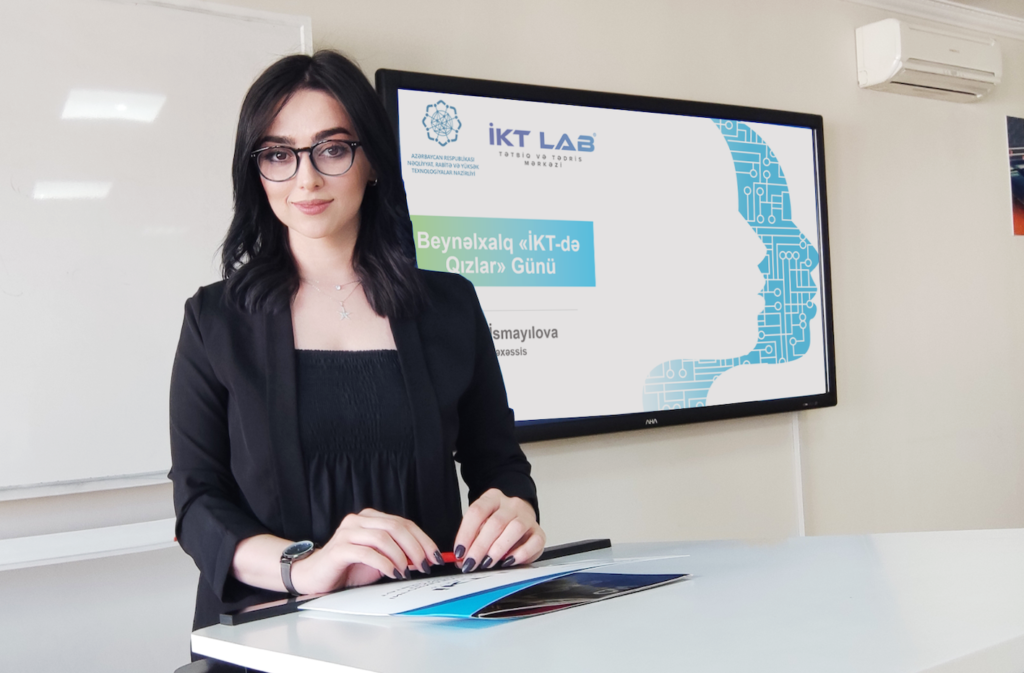 Gunel Ismaylova, digital specialist at the ICT Applying and Training Centre
Gunel Ismaylova, digital specialist at the ICT Applying and Training Centre
There is also a free digital learning portal (https://iktlab.edu.az/) and online multimedia courses.
“Recently we have seen an increase in the number of ICT specialists and the recognition of new digital jobs in our country,” says Jabarov. “ICT-oriented professional programmes have been created in the leading universities of Azerbaijan and in vocational schools.”
Work on training businesses and staff in digital skills has also been expanded. The Small and Medium-sized Enterprises Development Agency organises training sessions for entrepreneurs. Under the State Employment Service’s initiative, trainings are also organised for the unemployed to help them to develop digital skills. And the education system is paying special attention to the digital transformation. The Ministry of Education’s Digital Skills project covers 120,000 students and 1,300 teachers alone. The scale of the project is growing every year, and it is expected that 160,000 students will take part in the training sessions in the next academic year. There are also STEM centres in schools, where students gain knowledge and skills in areas such as robotics, electronics, and mechanics.
‘During the pandemic, only digital skills helped to keep some areas partly active’
The head of the ICT LAB says that job, education, healthcare and various services were able to continue operating online during the pandemic thanks to people’s digital skills and the use of existing Internet tools.
“Today, it is not difficult for students and teachers to use e-learning portals and attend their lessons via Microsoft Teams, Zoom, and other applications. This is a significant achievement. You can also see successful results in the training of professional ICT specialists. The development of all levels of ICT education has resulted in an increase in the number of specialists in this field.”
In 2019, the number of people working in ICT in Azerbaijan reached 19,300, 2,000 more than in the previous year. The use of government and electronic banking services has also significantly increased. In 2020, there were 1,270,000 registered users on the e-government portal, and the number of users is increasing by about 200,000 every year. Online and mobile banking services are also constantly growing, and cashless payments are widely used.
“The development of digital skills plays a vital role in the number of users and the increase in the use of electronic services,” says Jaborov, but warns that digital literacy is essential to minimise the risk of cyber threats and fraud as we use more and more online services.
EU support has been critical
Rauf Jabarov said EU support was crucial in supporting Azerbaijan to develop various aspects of the digital society, from the development of broadband internet to cybersecurity, skills development in the digital economy and the creation of more digital jobs.
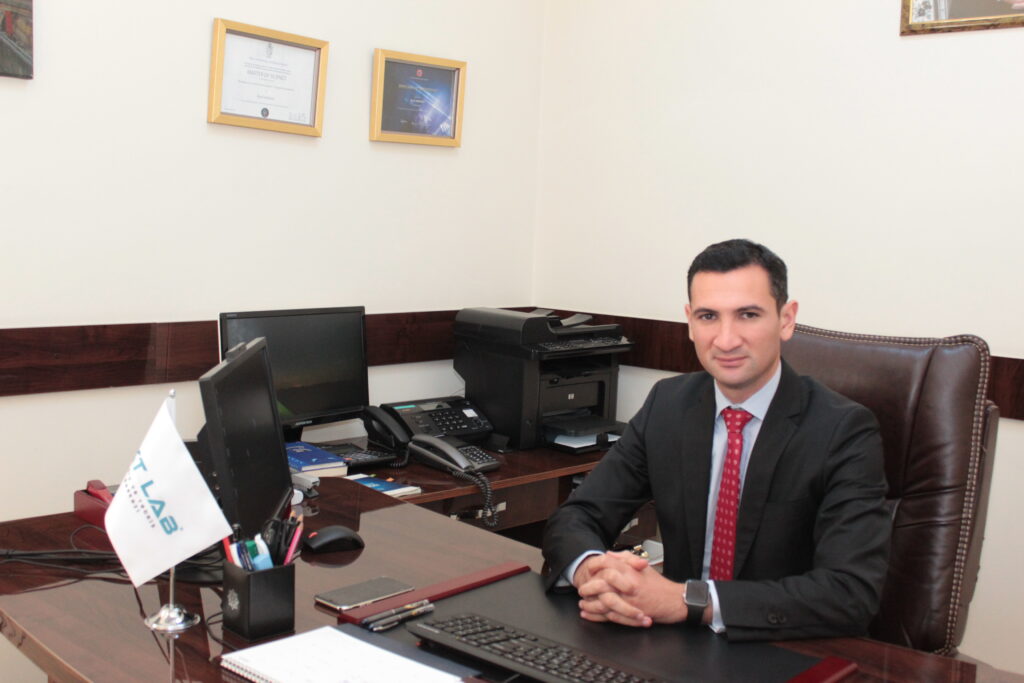 Rauf Jabarov
Rauf Jabarov
“The EU4Digital project covers several thematic areas, and with close cooperation with the EU, significant work is done. The main goal is to introduce EU good practices in digital skills in our country. EU Member States have clear standards related to digital skills. They have best practices related to the identification and measurement of digital skills. For each profession, competency frameworks, profiles of various professions and required digital skills have already been defined.”
He highlighted the importance of the methodology for measuring and forecasting digital skills. “People need to know exactly which digital skills are required. Employers should define the workers and the professions they need. Currently, the practice of measuring digital skills in our country is poorly developed. This project will make it possible to apply the necessary methods and practices for that purpose in our country.”
“Without doubt, EU4Digital will have a significant impact on the development of digital skills here. The most important thing is to ensure the continuous development of digital skills. Further work in this area will lead to outstanding results in the development of the digital economy and society,” Jabarov insists.
The value digital skills add to our lives
Gunel Ismayilova acquired her digital skills through the ‘Digital Girls – National Training Programme’ and the ‘Online multimedia course and web portal development for women in IT’, both implemented by the ICT LAB.
“Thanks to the digital skills I have acquired, I currently work as a specialist at the ICT Applying and Training Centre. I actually applied the knowledge I learned during the project and the internship programme at the ICT LAB, and thanks to this knowledge I found a job at this centre.”
Ismayilova supports the expansion of such projects, especially for women: “Nowadays, people are increasingly interested in ICT in all areas, due to the tendency towards digitalisation. There is a demand for training programmes and projects on ICT in Azerbaijan. The recent increase in the number of such projects plays an essential role in the development and improvement of women’s digital skills.”
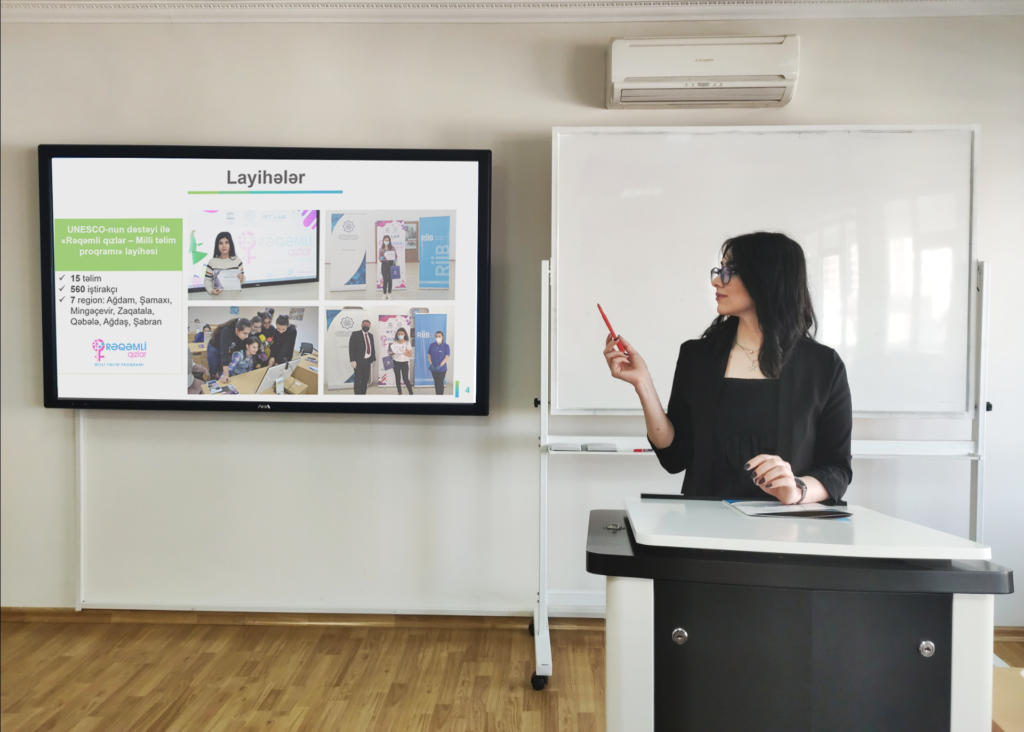 Gunel Ismaylova
Gunel Ismaylova
Māra Jākobsone from EU4Digital agrees. She sees diversity in the workforce as an invaluable opportunity for business and says that ICT companies in Europe are keen to attract women. The future is bright for women like Gunel: “Highly skilled women in tech will have many opportunities,” the EU4Digital expert says.
But digital skills will be vital for everyone, says Jākobsone: “More than 95% or more of all jobs require digital knowledge. Most government services are already online or will be provided online in the near future. If citizens do not have the appropriate skills, they will lose many opportunities related to work, education, services and social interaction. In fact, the lack of digital skills can lead not only to the digital divide but also to social and economic isolation.”
Article published in Azerbaijani by Oxu.az
Find out more
EU4 Digital https://eufordigital.eu
EU4Digital eSkills https://eufordigital.eu/thematic-area/eskills/
EU Delegation in Azerbaijan https://eeas.europa.eu/delegations/azerbaijan_en
ICT LAB https://iktlab.az
ICT LAB Digital Girls training programme https://iktlab.az/digitalgirls/
Through the EU4Digital Initiative, the European Union supports the implementation of digital skills strategies in the Eastern Partnership countries, in particular by:
- Drafting a methodology for measuring and forecasting national digital skills gaps;
- Defining a common competence framework for SMEs and microbusinesses;
- Supporting the creation of national coalitions for skills and jobs, now established in Armenia, Azerbaijan and Ukraine, with ongoing support to create them in Belarus, Georgia and Moldova;
- Carrying out training seminars and workshops;
- Implementing promotion campaigns in partner countries.
MOST READ
SEE ALSO

No, time is not on Russia‘s side
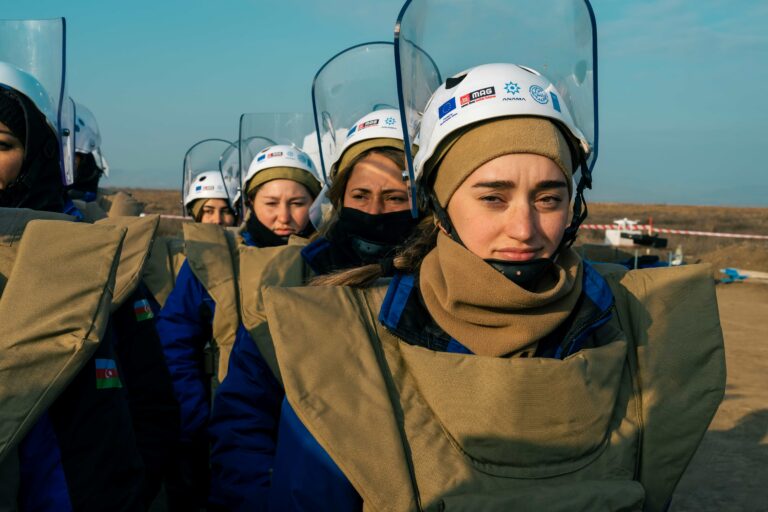
I have no regrets: the Azerbaijani women trained to clear mines
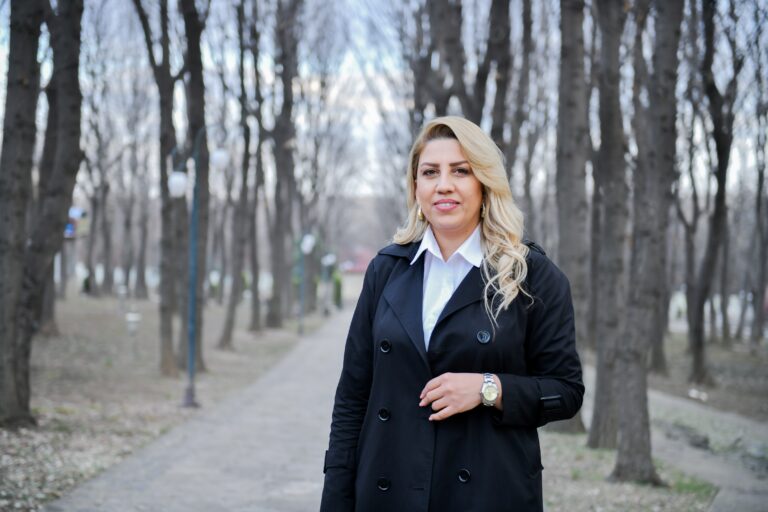
Turning a hobby into business: how Vusala Akhmadova from Tovuz helps women and children develop

Be one step ahead of a hacker: check simple cybersecurity tips!
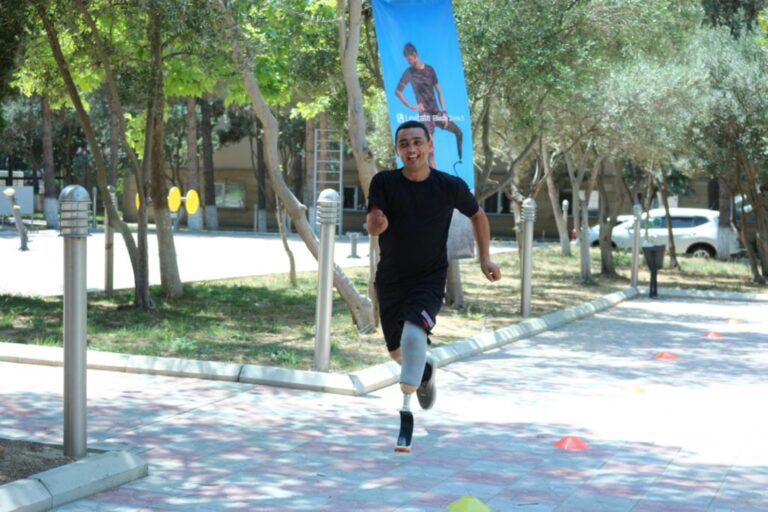
A chance for a better life: restoring justice for people with disabilities in Azerbaijan
More campaign pages:
Interested in the latest news and opportunities?
This website is managed by the EU-funded Regional Communication Programme for the Eastern Neighbourhood ('EU NEIGHBOURS east’), which complements and supports the communication of the Delegations of the European Union in the Eastern partner countries, and works under the guidance of the European Commission’s Directorate-General for Neighbourhood Policy and Enlargement Negotiations, and the European External Action Service. EU NEIGHBOURS east is implemented by a GOPA PACE-led consortium. It is part of the larger Neighbourhood Communication Programme (2020-2024) for the EU's Eastern and Southern Neighbourhood, which also includes 'EU NEIGHBOURS south’ project that runs the EU Neighbours portal.

The information on this site is subject to a Disclaimer and Protection of personal data. © European Union,







